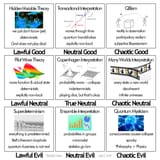An argument for libertarian free will
1) Transcendental Argument from Rational Deliberation (self-defeat of strict unfreedom)
P1. To rationally deliberate and believe for reasons you must be able, at the moment of settling on a belief/intention, to select among live alternatives in light of reasons (call this agential control).
P2. If no LFW exists, then either (D) strict determinism is true, making exactly one continuation of the world possible, or (L) only undirected luck resolves alternatives. Under (D) you never genuinely select; under (L) the resolution is not yours (no authorship). In both cases, agential control is absent.
P3. Denying agential control undermines the rational status of any belief reached via deliberation—including the belief “there is no LFW.” (It becomes a mere byproduct of prior causes or luck, not something you had reason-guided power to accept or reject.)
C1. Therefore, the denial of LFW is epistemically self-defeating unless we abandon the possibility of rational belief altogether.
P4. We are more certain that rational deliberation occurs (Moorean fact of practice) than of any sweeping metaphysical thesis that would make it impossible.
C2. So we must accept that some agential control exists—i.e., there are situations in which an agent can do otherwise and is the source of which alternative is selected. That is (a modest form of) LFW.
(This doesn’t claim infallible metaphysical certainty; it’s a transcendental “you can’t deny it without using it” result.)
P1. To rationally deliberate and believe for reasons you must be able, at the moment of settling on a belief/intention, to select among live alternatives in light of reasons (call this agential control).
P2. If no LFW exists, then either (D) strict determinism is true, making exactly one continuation of the world possible, or (L) only undirected luck resolves alternatives. Under (D) you never genuinely select; under (L) the resolution is not yours (no authorship). In both cases, agential control is absent.
P3. Denying agential control undermines the rational status of any belief reached via deliberation—including the belief “there is no LFW.” (It becomes a mere byproduct of prior causes or luck, not something you had reason-guided power to accept or reject.)
C1. Therefore, the denial of LFW is epistemically self-defeating unless we abandon the possibility of rational belief altogether.
P4. We are more certain that rational deliberation occurs (Moorean fact of practice) than of any sweeping metaphysical thesis that would make it impossible.
C2. So we must accept that some agential control exists—i.e., there are situations in which an agent can do otherwise and is the source of which alternative is selected. That is (a modest form of) LFW.
(This doesn’t claim infallible metaphysical certainty; it’s a transcendental “you can’t deny it without using it” result.)

